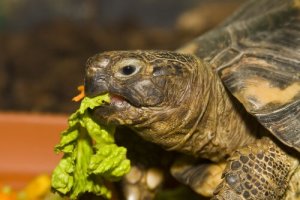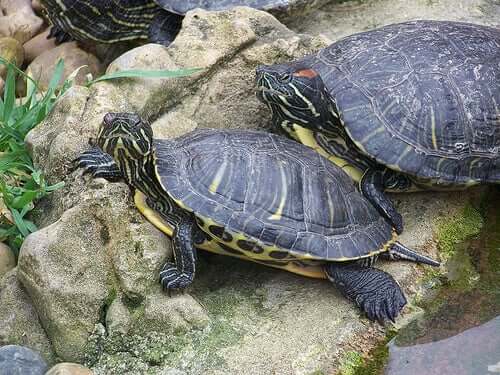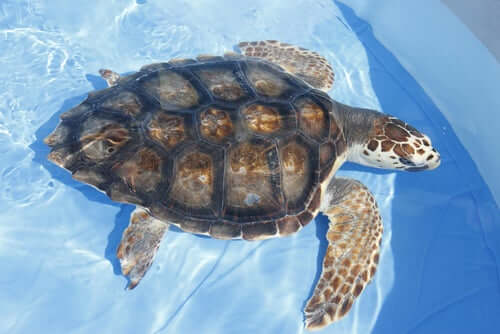What to Feed Your Turtle or Tortoise


Written and verified by the lawyer Francisco María García
You should feed your turtle or tortoise the nutrients it needs to achieve optimal development. This way, you ensure it stays healthy and lives harmoniously with its surrounding environment.
An ideal pet
Turtles and tortoises are from the reptile family, along with alligators, crocodiles, snakes, lizards, and iguanas. Undoubtedly, they represent the most friendly reptile for humans to live with.
They’re an excellent choice for a first pet for a child, since they usually teach them about the responsibility of caring for an animal. The best part is that they don’t require a lot of time or space. Turtles and tortoises are independent, quiet, and easily adaptable.
However, they also need attention to develop healthily and a proper diet to ensure balance. For this reason, we decided to propose simple tips regarding what to feed your turtle or tortoise so you don’t make any unnecessary mistakes.

Source: neusitas
What to feed your turtle or tortoise
The difference between turtles and tortoises is that turtles are aquatic and tortoises are terrestrial. Both require special care to preserve their good health.
Taking care of a turtle
When you choose to care for a turtle in an artificial environment, it’s essential to pay close attention when it comes to designing its habitat.
The first step is to choose a suitable aquarium. Turtles need room to swim and move freely. Swimming is essential for them as it allows them to strengthen their bodies and balance their metabolism.
Therefore, the aquarium must be at least four times bigger than the animal. The larger the space, the better your turtle’s quality of life.
The second step is to prepare the aquarium correctly. Just filling it with water isn’t enough. The aquarium should have two separate environments: a pool (the “wet part”) for it to swim and a dry part above the water where it can sunbathe, dry itself, and rest.
Turtles hydrate themselves, breathe, and feed underwater. Therefore, it’s essential to provide your turtle clean, fresh water to ensure it stays healthy. Ideally, the aquarium should have a filter system and you should clean it thoroughly every week.
What to feed your turtle
Turtles are omnivores. In their natural habitat, they usually feed on algae and other aquatic plants, small fish, crustaceans, and mollusks. During its first stage of growth (up to adulthood), it requires more protein.
You can find special commercial feed for turtles. This is an excellent option, as it ensures a nutritional, balanced diet at every stage of your turtle’s life.
However, you should also integrate natural and fresh elements into your turtle’s daily diet, such as fruits, vegetables, seaweed, raw fish meat, small shellfish, and crustaceans.
Taking care of a tortoise
Tortoises don’t require such an elaborate habitat. You can choose to let it loose at home, especially when if you have a garden or natural greenery.
However, to be safe, it’s best to buy a terrarium. The space should be four to five times bigger than the animal and you should clean it weekly.
What to feed your tortoise
Tortoises are essentially herbivores. In their natural habitat, they consume a lot less protein than their aquatic relatives. But a tortoise may also consume small insects and worms, mainly during its stage of greater development.
You can also find special commercial feed for tortoises. They should be your tortoise’s nutritional foundation, as they offer appropriate proportions for every stage of your tortoise’s life.
In addition, you should also feed your tortoise vegetables, fruits, flowers, herbs, small pieces of raw meat, and worms.
It also needs to consume a lot of calcium and phosphorus to keep its shell strong and sturdy.

Foods you shouldn’t feed your turtle or tortoise
Although turtles and tortoises enjoy a varied diet, you should avoid feeding them some foods in order to preserve their health.
- Fruits. Choose pears, apples, and melons. Avoid bananas and citrus fruits.
- Vegetables. Lettuce at will. Avoid spinach, beans, asparagus, mushrooms, peppers, sweet potatoes, beets, and squash.
- Meats. Avoid white and red meats that contain a lot of fat.
You should never feed your turtle cooked, seasoned, and/or industrialized foods, as they can cause serious digestive problems. Another good tip is to prefer organic vegetables and fruits to make sure your turtle doesn’t ingest toxic fertilizers.
You should feed your turtle or tortoise the nutrients it needs to achieve optimal development. This way, you ensure it stays healthy and lives harmoniously with its surrounding environment.
An ideal pet
Turtles and tortoises are from the reptile family, along with alligators, crocodiles, snakes, lizards, and iguanas. Undoubtedly, they represent the most friendly reptile for humans to live with.
They’re an excellent choice for a first pet for a child, since they usually teach them about the responsibility of caring for an animal. The best part is that they don’t require a lot of time or space. Turtles and tortoises are independent, quiet, and easily adaptable.
However, they also need attention to develop healthily and a proper diet to ensure balance. For this reason, we decided to propose simple tips regarding what to feed your turtle or tortoise so you don’t make any unnecessary mistakes.

Source: neusitas
What to feed your turtle or tortoise
The difference between turtles and tortoises is that turtles are aquatic and tortoises are terrestrial. Both require special care to preserve their good health.
Taking care of a turtle
When you choose to care for a turtle in an artificial environment, it’s essential to pay close attention when it comes to designing its habitat.
The first step is to choose a suitable aquarium. Turtles need room to swim and move freely. Swimming is essential for them as it allows them to strengthen their bodies and balance their metabolism.
Therefore, the aquarium must be at least four times bigger than the animal. The larger the space, the better your turtle’s quality of life.
The second step is to prepare the aquarium correctly. Just filling it with water isn’t enough. The aquarium should have two separate environments: a pool (the “wet part”) for it to swim and a dry part above the water where it can sunbathe, dry itself, and rest.
Turtles hydrate themselves, breathe, and feed underwater. Therefore, it’s essential to provide your turtle clean, fresh water to ensure it stays healthy. Ideally, the aquarium should have a filter system and you should clean it thoroughly every week.
What to feed your turtle
Turtles are omnivores. In their natural habitat, they usually feed on algae and other aquatic plants, small fish, crustaceans, and mollusks. During its first stage of growth (up to adulthood), it requires more protein.
You can find special commercial feed for turtles. This is an excellent option, as it ensures a nutritional, balanced diet at every stage of your turtle’s life.
However, you should also integrate natural and fresh elements into your turtle’s daily diet, such as fruits, vegetables, seaweed, raw fish meat, small shellfish, and crustaceans.
Taking care of a tortoise
Tortoises don’t require such an elaborate habitat. You can choose to let it loose at home, especially when if you have a garden or natural greenery.
However, to be safe, it’s best to buy a terrarium. The space should be four to five times bigger than the animal and you should clean it weekly.
What to feed your tortoise
Tortoises are essentially herbivores. In their natural habitat, they consume a lot less protein than their aquatic relatives. But a tortoise may also consume small insects and worms, mainly during its stage of greater development.
You can also find special commercial feed for tortoises. They should be your tortoise’s nutritional foundation, as they offer appropriate proportions for every stage of your tortoise’s life.
In addition, you should also feed your tortoise vegetables, fruits, flowers, herbs, small pieces of raw meat, and worms.
It also needs to consume a lot of calcium and phosphorus to keep its shell strong and sturdy.

Foods you shouldn’t feed your turtle or tortoise
Although turtles and tortoises enjoy a varied diet, you should avoid feeding them some foods in order to preserve their health.
- Fruits. Choose pears, apples, and melons. Avoid bananas and citrus fruits.
- Vegetables. Lettuce at will. Avoid spinach, beans, asparagus, mushrooms, peppers, sweet potatoes, beets, and squash.
- Meats. Avoid white and red meats that contain a lot of fat.
You should never feed your turtle cooked, seasoned, and/or industrialized foods, as they can cause serious digestive problems. Another good tip is to prefer organic vegetables and fruits to make sure your turtle doesn’t ingest toxic fertilizers.
This text is provided for informational purposes only and does not replace consultation with a professional. If in doubt, consult your specialist.








